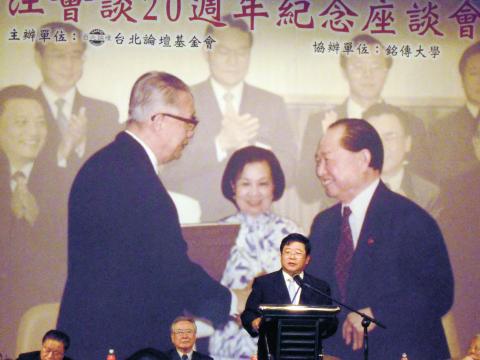Both sides of the Taiwan Strait should create a “positive environment” for resolving political differences and adopt a “first the easy, then the difficult” approach to furthering bilateral ties, a visiting Chinese official told a forum in Taipei yesterday.
“Without proper management or being partially dealt with, the political differences [between the two sides] will hamper the development of cross-strait relations,” said Sun Yafu (孫亞夫), deputy director of China’s Taiwan Affairs Office (TAO).
The forum was organized by the Taipei Forum Foundation, a Taiwan-based think tank, to commemorate the 20th anniversary of a bilateral negotiation held in Singapore between April 27 and April 29, 1993 — the first official contact between the Republic of China and the People’s Republic of China since the end of the Chinese Civil War in 1949.

Photo: CNA
The unprecedented negotiations, also known as the “Koo-Wang talks,” saw then Straits Exchange Foundation (SEF) chairman Koo Chen-fu (辜振甫) and his Chinese counterpart, then Association of Relations Across the Taiwan Strait (ARATS) chairman Wang Daohan (汪道涵), sign four agreements.
Sun, who also serves as ARATS vice president, said that while Beijing has “confidence and patience” in the peaceful development of cross-strait engagement, it believes that such ties should make progress on every front, including the political one.
He said he supported a proposal to establish a cross-strait think tank or forum to discuss and contemplate “sensitive topics” that could not yet be negotiated by the Taiwanese and Chinese governments.
Sun praised the meeting as a “milestone,” but it seemed that every speaker at the forum was aware that the next phase of bilateral engagement and China’s intention to facilitate political talks with Taiwan would be the most important issues.
Former vice president Vincent Siew (蕭萬長), former Chinese Nationalist Party (KMT) chairman Wu Po-hsiung (吳伯雄) and former premier Liu Chao-shiuan (劉兆玄) said that the time was not ripe for the two sides to begin political negotiations due to the lack of consensus on the issue in Taiwan, with Liu saying that Beijing’s insistence on the “one China” framework had also contributed to the stalemate.
Former SEF chairman Chiang Pin-kung (江丙坤) urged President Ma Ying-jeou (馬英九) to seek a bilateral peace agreement and a pact on military confidence-building measures with China before then end of his term, and called for granting Chinese television stations broadcasting licenses in Taiwan.
“To counteract the much-criticized media chaos in Taiwan, we can bring in TV stations like China Central Television and Phoenix Television, which present much better coverage of international news,” Chiang said.
The proposal reflected the urgency for Taiwan to build up its confidence — economically and culturally — against a rising China, Chiang said, adding that Taiwan also has to be determined in carrying out trade liberalization and regional economic integration.

The CIA has a message for Chinese government officials worried about their place in Chinese President Xi Jinping’s (習近平) government: Come work with us. The agency released two Mandarin-language videos on social media on Thursday inviting disgruntled officials to contact the CIA. The recruitment videos posted on YouTube and X racked up more than 5 million views combined in their first day. The outreach comes as CIA Director John Ratcliffe has vowed to boost the agency’s use of intelligence from human sources and its focus on China, which has recently targeted US officials with its own espionage operations. The videos are “aimed at

STEADFAST FRIEND: The bills encourage increased Taiwan-US engagement and address China’s distortion of UN Resolution 2758 to isolate Taiwan internationally The Presidential Office yesterday thanked the US House of Representatives for unanimously passing two Taiwan-related bills highlighting its solid support for Taiwan’s democracy and global participation, and for deepening bilateral relations. One of the bills, the Taiwan Assurance Implementation Act, requires the US Department of State to periodically review its guidelines for engagement with Taiwan, and report to the US Congress on the guidelines and plans to lift self-imposed limitations on US-Taiwan engagement. The other bill is the Taiwan International Solidarity Act, which clarifies that UN Resolution 2758 does not address the issue of the representation of Taiwan or its people in

US Indo-Pacific Commander Admiral Samuel Paparo on Friday expressed concern over the rate at which China is diversifying its military exercises, the Financial Times (FT) reported on Saturday. “The rates of change on the depth and breadth of their exercises is the one non-linear effect that I’ve seen in the last year that wakes me up at night or keeps me up at night,” Paparo was quoted by FT as saying while attending the annual Sedona Forum at the McCain Institute in Arizona. Paparo also expressed concern over the speed with which China was expanding its military. While the US

SHIFT: Taiwan’s better-than-expected first-quarter GDP and signs of weakness in the US have driven global capital back to emerging markets, the central bank head said The central bank yesterday blamed market speculation for the steep rise in the local currency, and urged exporters and financial institutions to stay calm and stop panic sell-offs to avoid hurting their own profitability. The nation’s top monetary policymaker said that it would step in, if necessary, to maintain order and stability in the foreign exchange market. The remarks came as the NT dollar yesterday closed up NT$0.919 to NT$30.145 against the US dollar in Taipei trading, after rising as high as NT$29.59 in intraday trading. The local currency has surged 5.85 percent against the greenback over the past two sessions, central